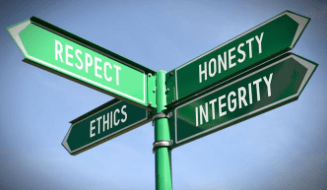Coming to the end of this year’s summer exam season, here is an interesting exam question and my response to it:
Respecting people does not have to include respecting their opinions or beliefs, no matter how sincerely they hold them. Discuss.
 It is not uncommon for me to be accused of disrespecting people when I lay into their beliefs. I generally see this as them wanting to to either close down the discussion, or else them exhorting me to have more respect for those beliefs essentially on the simplistic basis that they hold them and a kind of implied assertion that I should therefore be trusting them in their respect for those beliefs.
It is not uncommon for me to be accused of disrespecting people when I lay into their beliefs. I generally see this as them wanting to to either close down the discussion, or else them exhorting me to have more respect for those beliefs essentially on the simplistic basis that they hold them and a kind of implied assertion that I should therefore be trusting them in their respect for those beliefs.
Please note that I haven’t, so far, differentiated between categories of opinion/belief; religious, political or whatever. That is because I cannot see justification for doing so.  Opinions and/or beliefs to do with anything should be treated in the same way; with healthy scepticism until backed with evidence and/or a coherent rationale. This is, hopefully, not very contentious, and I know that it is the manner of the debates that needs addressing in order to ensure that mutual respect remains possible despite differences of opinion and/or beliefs.
Opinions and/or beliefs to do with anything should be treated in the same way; with healthy scepticism until backed with evidence and/or a coherent rationale. This is, hopefully, not very contentious, and I know that it is the manner of the debates that needs addressing in order to ensure that mutual respect remains possible despite differences of opinion and/or beliefs.
This is something that I admit to finding very challenging at times, and something that the nature of social media makes all the more difficult to maintain. Trolls, in particular find sport in going out of their way to wind people up and provoke disharmony and disrespect. I do not see it as a problem in responding directly back to these people in less than courteous manner once their troll status is clear, but it is when they provoke disrespect between others that they can do real damage. More challenging is having any sort of respect for people who subscribe wholesale to dangerous (usually right-wing) ideologies. Maintaining  respectful dialogues with Tories and fascists is something most people reading this will have found beyond them at times. Strangely, however, many of of the self same people seem to have less problem with extending respect to religious beliefs that are just as dangerous and often intertwined with the political opinions/beliefs they happily slag off.
respectful dialogues with Tories and fascists is something most people reading this will have found beyond them at times. Strangely, however, many of of the self same people seem to have less problem with extending respect to religious beliefs that are just as dangerous and often intertwined with the political opinions/beliefs they happily slag off.
Be it politics or religion, as a teacher I have come to understand that people’s worldview (incorporating their political and religious beliefs) are shaped in their formative years and by three fundamental things:
- The circumstances of their birth
- The environment/places in which they are raised
- The nurturing/guidance/indoctrination they receive from trusted adults around them.
On this basis, very little about a child’s beliefs and worldview comes from within them; from their intelligence, personality and character. These factors come into play as they mature and learn to evaluate and reflect on these three factors (or not as the case may be).  This is the basis, after all, on which we have notions of reaching an age of adult responsibility built into legal systems (although this opens yet another can of worms in itself).
This is the basis, after all, on which we have notions of reaching an age of adult responsibility built into legal systems (although this opens yet another can of worms in itself).
This means that, as responsible adults, we need to acknowledge that children are not responsible for their circumstances or even their behaviours, attitudes, beliefs or actions. Thus, whenever admonishing children, we need to be clear that it is the behaviour that we have issues with not the the child as a person. We should feel compelled to maintain our respect for all children, no matter how challenging that may be, in the knowledge that they are not the finished article, the fully developed human being, and recognise that treating them unfairly for things that are not their fault is potentially hugely damaging.  This is why the Trump administration’s appalling treatment of refugee children is so utterly contemptible to any decent person.
This is why the Trump administration’s appalling treatment of refugee children is so utterly contemptible to any decent person.
Adulthood, in my opinion, is when the young person not only completes the physical transitions brought about by hormones, but also the character transitions, brought about by self-analysis, developing intellectual capacity and the forging of their own identity. This transition is the tumultuous phase we know as adolescence. It is naturally difficult for both the individual and those around them.  Acknowledging this should lead us to respect what is going on and allowing them space and no little empathy as they go through it. After all, we have all been through ourselves.
Acknowledging this should lead us to respect what is going on and allowing them space and no little empathy as they go through it. After all, we have all been through ourselves.
It is, however, a very dangerous phase that has the potential to set, (almost) in stone, the persons character, attitudes and beliefs throughout their adult life. This is the phase in which so-called radicalisation is most likely to happen. Not that becoming a radical is necessarily a bad thing. Au contraire. Radicalism in the arts, culture, society, science and politics can be a hugely progressive and positive thing.  But when it gets tainted with, in particular, fascism and/or religion it can becomes a hugely negative thing.
But when it gets tainted with, in particular, fascism and/or religion it can becomes a hugely negative thing.
This raises questions of how much freedom should give to explore radical alternatives. There is, of course, a world of difference between investigating and exploring radical alternatives and actually committing to pursuing them. A rounded and progressive education should never shy away from critical analysis of extraordinary viewpoints. We have been doing it for years in subjects like Religious Studies (although I’d argue that the critical analysis has been inadequate). As pointed out already, radicalism can be hugely positive, and in those instances we need embrace it and facilitate it. But where should the line be drawn? I would argue that it should be determined by whether or not the consequences can be undone easily or not.  Radical fashion, music, literature and art are all fine. Radical surgery (perhaps ranging from tattoos to gender reassignment) perhaps needs to be deferred until the end of adolescence (although I know there are good arguments for allowing it sooner in some cases) for reasonable fear of significant regret.
Radical fashion, music, literature and art are all fine. Radical surgery (perhaps ranging from tattoos to gender reassignment) perhaps needs to be deferred until the end of adolescence (although I know there are good arguments for allowing it sooner in some cases) for reasonable fear of significant regret.
Such liberalism is anathema to our conservative establishment. This is why institutions such as our schools put so much weight on conformity and discipline.  We hear arguments that it is vital to a conducive learning environment for all, while in the next breath often the same people lament the lack of initiative, independent learning and invention in our kids. The truth is the system knocks it out of them at an early age, as the desire for an easy, manageable life prevails.
We hear arguments that it is vital to a conducive learning environment for all, while in the next breath often the same people lament the lack of initiative, independent learning and invention in our kids. The truth is the system knocks it out of them at an early age, as the desire for an easy, manageable life prevails.
We need to learn to respect every individual, be they conformists or radicals, because, at the end of the day we are all fundamentally the same; the same species, homo sapiens, human beings. It would be helpful, therefore to extend that principle of admonishing behaviours rather than individuals into adulthood. Easier said than done, admittedly.
When I lay into that fascist or religious bigot (a label that describes attitudes/beliefs being exhibited – so ok in my book), I really need to focus on the views and beliefs expressed rather than attack the person. A person patently does not have to be an idiot (a pejorative sleight on someone’s intelligence – so not ok to use casually) to express idiotic views, opinions and beliefs. None of us is immune from making idiotic utterances at times, but few of us would self-identify as idiots.
Of course, simplistic labelling of anything (people or ideas especially) is never adequate. For ideas/opinions/beliefs to merit respect, however, they need substantiating with verifiable evidence (which allows them to be considered knowledge) or else supported by robust rational argument (which allows them to be considered legitimate theory).  Education needs to focus on these core skills of evaluating evidence (the scientific method) and critiquing theory (philosophy). Deficiencies in these skills have allowed the phenomena of fake news to distort many people’s understanding of the world (not that it is a recent phenomena, as religion illustrates). A person that is intransigent about holding onto beliefs and ideas in the face of substantial evidence to the contrary is my definition of a fundamentalist. They are behaving in a fundamentally idiotic way, despite rarely being idiots.
Education needs to focus on these core skills of evaluating evidence (the scientific method) and critiquing theory (philosophy). Deficiencies in these skills have allowed the phenomena of fake news to distort many people’s understanding of the world (not that it is a recent phenomena, as religion illustrates). A person that is intransigent about holding onto beliefs and ideas in the face of substantial evidence to the contrary is my definition of a fundamentalist. They are behaving in a fundamentally idiotic way, despite rarely being idiots.
Thus, I really ought to apologise to the UKIP supporter that I recently described as a moron for suggesting that I wouldn’t have the freedom to travel around the country in a Marxist state. He turned out to be a reasonably well-educated civil servant. Patently not a moron, but someone who had simply makes moronic statements and simply needs to read a lot more!
Religion (of any and all varieties) is the foremost example of something that flies so blatantly in the face of logic and contradictory evidence, that I have no issue with it being described as idiotic, while simultaneously knowing full well that few of its adherents are idiots.
What we see with religion is copious evidence of the truth about people’s beliefs and perspectives being the product of those three key factors: the circumstances of their birth, the region in which they grow up, and the guidance/nurturing/indoctrination that they receive in their formative years. It is undeniable that the vast majority are brought up to follow the beliefs of their parents and/or to conform to their community’s norms. I know that it is hard NOT to be a Catholic in Poland and to NOT be a Muslim in Saudi Arabia, for example. To follow a different path in such places leads to consequences ranging from discrimination, to ostracism, to beatings, through to death in some cases.
I therefore struggle to respect attempts to enforce conformity and have the utmost respect for ‘radicals’ prepared to stand up and challenge the absurdities being thrust upon them.  It is a brave and noble attitude that speaks to the character of martyrs throughout history (despite the questionable causes that some people have martyred themselves for). I can respect the conviction and selflessness of religious martyrs, for example, while simultaneously being bemused at the stupidity and futility of such an act. In contrast, Emily Davidson’s martyrdom at the feet of the King’s horse proved far from futile and took the world forward, such that we have recently been celebrating the centenary of what was achieved. I am sure we could still argue as to whether that act itself was an idiotic thing to do.
It is a brave and noble attitude that speaks to the character of martyrs throughout history (despite the questionable causes that some people have martyred themselves for). I can respect the conviction and selflessness of religious martyrs, for example, while simultaneously being bemused at the stupidity and futility of such an act. In contrast, Emily Davidson’s martyrdom at the feet of the King’s horse proved far from futile and took the world forward, such that we have recently been celebrating the centenary of what was achieved. I am sure we could still argue as to whether that act itself was an idiotic thing to do.
In conclusion, if we wish to be considered to be a fully-fledged, well-rounded, independent free thinker, we have to undertake the appropriate self-analysis to understand where our views and beliefs stem from and be willing to challenge their robustness and worthiness. We then need to have the courage to act on the conclusions of that analysis – despite the huge challenges and obstacles this may present. There is no point in martyrdom, but it should at the very least inform some of our actions, such as how we treat others, how we vote, causes we choose to support etc.
Some people will be incapable of such an undertaking. Few are good at it. Whatever, we should maintain respect for them as individual human beings while being prepared to constantly challenge their views, be they fascist, religious or some other such nonsense. At the same time, we need to keep our minds open enough to be receptive to evidence that challenges our position on things. This ability to change opinion and beliefs is a huge strength, not a weakness, and should be acknowledged as such.
Having said all this, if you ever see me becoming a fascist or ‘finding God’, you have my permission to call me an idiot and I promise to thank you rather than take any offence. Amen.
 P.S. For those who may think I go too far in apparently equating religion and fascism, I’m not saying they are in any way the same beyond both being objectionable and misguided ideologies. However, this definition below, does it define fascism or religion?
P.S. For those who may think I go too far in apparently equating religion and fascism, I’m not saying they are in any way the same beyond both being objectionable and misguided ideologies. However, this definition below, does it define fascism or religion?
“Characterised by authoritarian views and strong central control, with little or no tolerance of opposing opinions.”
